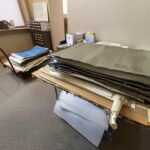by Natalie Fritz, Archivist & Outreach Director, Clark County Historical Society at the Heritage Center.
Each October, the Society of Ohio Archivists celebrates American Archives Month by highlighting the important work of preserving and sharing Ohio’s history. Every year, the SOA Advocacy and Outreach Committee selects a theme and invites archives across the state to submit up to three images per institution that best represent the theme. After SOA members vote on their favorites, the top ten images are used to create the year’s Archives Month poster, which was recently revealed during a virtual unveiling event in September.
This year’s theme, “Ohio Born Companies,” celebrates the countless businesses that got their start here in the Buckeye State. From family-owned shops to manufacturing giants, Ohio has long been a place where innovation and hard work converge. Archives across the state, both large and small, play a vital role in documenting those businesses and the communities that shaped them.
Collecting the Story of Local Industry

Springfield City Directories, 1852–2020. An invaluable resource to trace the evolution of local businesses & their locations.
In our archives at the Clark County Historical Society at the Heritage Center in Springfield, Ohio, one of the most used resources is our collection of Springfield City Directories, dating from 1852 through 2020. These volumes are indispensable for tracing the history of a business, helping researchers determine when a company first appeared, where it was located, and how it evolved over time.
We use them regularly to identify local companies pictured in historic photographs and to connect visual materials to their broader stories.
Telling the Stories of Businesses “Born in Clark County”
In 2015, we began partnering with local businesses to develop exhibits celebrating their histories. Each featured company had to be at least 50 years old, or, if no longer locally owned, at least 100. Every business we showcased easily surpassed that benchmark, with most well over 100 years old.

Woeber Mustard Exhibit, 2015. Part of our Born in Clark County series celebrating long-standing local businesses.
The exhibit series “Born in Clark County”, featuring Woeber Mustard, a beloved Springfield institution still going strong after more than a century. Members of the Woeber family are shown here in front of the exhibit. We also highlighted other long-standing local companies such as Brain Lumber, Scarff’s Nursery, a law firm, Cole Acton Harmon & Dunn, and Sweet Manufacturing.
Interestingly, many of these exhibits began not with materials already in our archives, but through partnerships. The businesses themselves loaned artifacts, photographs, and documents, some of which were later donated, to help us share their stories with the community. These collaborations demonstrate that documenting local business history often starts with building relationships.
Crowell-Collier: From Farm and Fireside to a National Name

Bound volumes of Collier’s & The American Magazine. These grew from Springfield’s Crowell-Collier Publishing Company & reached readers nationwide.
Another cornerstone of Springfield’s business history is Crowell-Collier Publishing. The company’s story began locally with Farm and Fireside magazine, a publication originally created to promote farm machinery. Over time, it grew into Collier’s Magazine, The American Magazine, and others, periodicals that reached readers across the nation.
As a major local employer, Crowell-Collier shaped Springfield’s identity for decades. Today, researchers can explore this legacy through our collection of bound volumes those locally published magazines, housed in our research library, a tangible reminder of a Springfield company whose reach extended far beyond Ohio.
Preserving and Sharing Industrial Heritage

International Harvester Blueprints. Selected blueprints were preserved locally, with the remainder (shown here) transferred to the Navistar corporate archives in Illinois.
Manufacturing has long been at the heart of Springfield’s story, and no company represents that legacy better than International Harvester. For decades, we held two large map drawers filled with unprocessed International Harvester blueprints, donated in the late 1980s. In early 2024, we finally tackled the collection, evaluating hundreds of blueprints and selecting several dozen to preserve locally for their research and historical value. The rest were deaccessioned and transferred to the Navistar/International Harvester corporate archives in Illinois, where they joined the company’s larger historical collection.
We also preserve a large general collection on International Harvester and early employee records. When they were donated, they came to us in four massive green wooden boxes filled with employee record cards from roughly 1900–1920. When they arrived in 2016, we guessed there were maybe 5,000 cards, but after months of organizing, alphabetizing, and typing the data with the help of over 15 volunteers, we discovered there were 17,226 in total!

Original boxes of International Harvester Employee Records. The boxes held more than 17,000 employee cards, now fully processed & accessible for research.
Now housed safely in acid-free boxes, the records are fully accessible to researchers. We hope they’ll continue to help families trace their relatives’ working lives in Springfield’s industrial era.
View the Records here.
We hold similar records for SPECO (Steel Products Engineering Co.), another major Springfield manufacturer whose employee cards are also available for research.
Explore the SPECO Employee Records.
Why Collecting Local Businesses Matters
Collecting the stories of local businesses, whether through records, photographs, publications, or partnerships, helps preserve more than company histories. It captures community life: the places people worked, the industries that shaped neighborhoods, and the innovations that put Ohio on the map.
Tracing business history isn’t always easy. Companies change hands, merge, relocate, or shift focus over time. But through the work of archives, those complex stories remain accessible. Each ledger, photograph, and directory entry brings us closer to understanding how these businesses, and the people behind them, made Ohio what it is today.
As we close out another American Archives Month, we celebrate not only those companies “Born in Ohio,” but also the archivists, researchers, and community partners who ensure their stories live on.
Questions? Contact the Advocacy and Outreach Committee Cochairs Christine Liebson and Emily Rebmann.
Last Updated on November 7, 2025 by Emily Gainer
